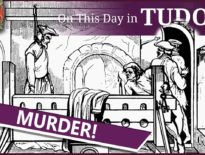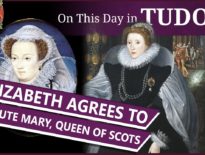On this day in Tudor history, 3rd December 1600, sixty-nine-year-old peer and politician Roger North, 2nd Baron North, died at his London home.
North was a good friend of Robert Dudley, Earl of Leicester, accompanying him on trips, witnessing his secret marriage and serving with him in the Netherlands. It was even said that he'd converted Leicester to Puritanism! North also served Elizabeth I as Privy Councillor and Treasurer of the Household and was close to the queen.
Find out more about Leicester's good friend Roger North, his life and career, in today's talk.
Also on this day in Tudor history, 3rd December 1536, a proclamation was made to the rebels of the Pilgrimage of Grace offering them a pardon. Henry VIII offered the rebels "free pardons" for their rebellion against him, his advisors and his religious measures, yet prominent rebels ended up being executed. I explain what happened in last year’s video:
Also on this day in history:
- 1577 – Death or burial of William Downham, Bishop of Chester and former
Chaplain of Elizabeth I before her accession. He was buried in the choir of Chester Cathedral.
Transcript:
On this day in Tudor history, 3rd December 1600, sixty-nine-year-old peer and politician Roger North, 2nd Baron North, died at his London home in Charterhouse Square. He was given a funeral service at St Paul's, followed by a burial at Kirtling in Cambridgeshire.
North was a friend of Robert Dudley, Earl of Leicester, and served Elizabeth I as Privy Councillor and Treasurer of the Household.
Let me share with you a few more facts about this Tudor man…
• North was born on 27th February 1531 in London, in the parish of St Thomas the Apostle. He was the eldest child of Alice Squire and lawyer Edward North, 1st Baron North, who had served as a privy councillor to Henry VIII, Edward VI and Mary I.
• It’s not known where he was educated, but he entered Lincoln’s Inn, one of London’s inns of the court, in 1542, and his father introduced him to Henry VIII’s court in his youth and he learned to joust there.
• In around 1547, when he was 16, North married Winifred Rich, a daughter of Richard Rich, 1st Baron Rich, and widow of Sir Henry Dudley. They went on to have 4 children, three sons and a daughter, but their eldest son died in infancy.
• North was a Member of Parliament for Cambridgeshire in 1555, 1559 and 1563, and a Justice of the Peace for the county in 1558-9.
• In the coronation celebrations for Elizabeth I in January 1559, he was created a Knight of the Bath and jousted as one of the challengers in the Greenwich grand tournament later that year.
• In 1561, he was admitted to Gray’s Inn, and then, following the death of his father in 1564, he spent time managing the estates, land and properties he’d inherited in Cambridgeshire and Suffolk, and Middlesex. He sold Charterhouse in London to Thomas Howard, 4th Duke of Norfolk, in 1565. This was the mansion where his father had played host to Elizabeth I for six days in 1558, shortly after her accession.
• North’s power in Cambridgeshire grew when he was elected alderman and burgess in 1568, then made Lord Lieutenant in 1569 and High Steward in 1572. In 1579, he also served as a Justice of the Peace for Suffolk and the Isle of Ely.
• North also served Elizabeth as a diplomat, accompanying the Earl of Sussex to Vienna in 1567 to invest Emperor Maximilian II with the Order of the Garter. Then, in 1574, he was sent to France to congratulate Henri III on his accession and playing a part in negotiating a renewal of the Treaty of Blois. His time in France was mainly positive, but he did get angry when a fool at the court dressed up as Henry VIII, who was, of course, the queen’s father.
• North played host at his home in Kirtling to the queen during her progress of 1578 and records show that he regularly played cards with the queen, so was obviously in favour. He was also good friends with Robert Dudley, Earl of Leicester, and Francis Russell, 2nd Earl of Bedford. He accompanied Leicester on trips to take the waters at Buxton and Bath in 1578 and 1587, and spent other times with him at his properties. He also witnessed Leicester’s secret marriage to Lettice Devereux in 1578, had custody of the earl’s illegitimate son, and stood as godfather to his son by Lettice .
North did not get on with Richard Cox, Bishop of Ely. The two argued over a lease and in 1575 North accused him of ignoring the queen’s instructions.
• His wife died in late 1578/early 1579, but although he did start negotiations to marry a daughter of Sir Thomas Rivett, he never remarried.
• The 1584 “Leicester’s Commonwealth”, a Catholic work of propaganda that attacked Robert Dudley, Earl of Leicester, accused North of converting Leicester to Puritanism, and North did complain in that same year to Baron Burghley regarding a Chief Justice who wasn’t sympathetic to Puritan ministers. North was certainly a staunch Protestant.
• In 1585, North and his eldest son, John, accompanied Leicester and English forces to the Netherlands, where they supported the Dutch against Philip II of Spain. In 1586, North served as Governor of Flushing, Utrecht and Harlingen, and was recorded as showing great courage at the Battle of Zutphen. He’d been shot in the knee, but carried on regardless. He was rewarded by being made Knight Banneret by his friend, Leicester. He continued service under Peregrine Bertie, when Leicester was recalled, but returned to England in April 1588 to do his duty as Lord Lieutenant of Cambridgeshire and prepare for the potential Spanish invasion.
• When the queen visited Tilbury Fort to raise morale there in August 1588, North commanded part of her bodyguard.
• In late 1588, he was made Governor of Berwick and in 1596 he was made privy councillor and treasurer of the household.
• Sadly, in 1597, his eldest son, John, died, so when North died on 3rd December 1600, his grandson, Dudley, was his heir and became 3rd Baron North.
• A funeral service for North took place at St Paul’s on 22nd December 1600 and his remains were taken to Kirtling, in Cambridgeshire, and buried there on 12th February 1601. In his will, he left a gift of £100 in gold to his beloved queen, stating that it was “in acknowledgment of my love and duety to her Majesty from whom I have receaved advauncement to honor and many and contynuall favours”.



Leave a Reply